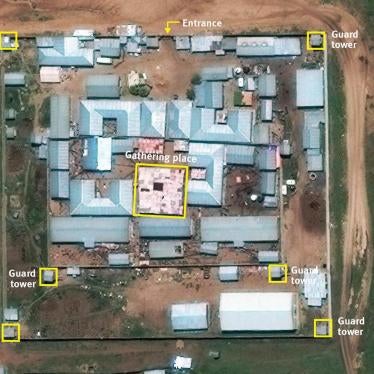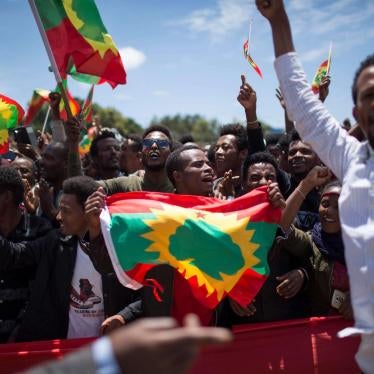One year ago this month, Dr. Abiy Ahmed was sworn in as prime minister of Ethiopia. His first few months in office saw many positive human rights reforms and a renewed sense of optimism following several years of protests and instability, along with decades of repressive authoritarian rule. Thousands of political prisoners have been released, a peace agreement has been signed with neighboring Eritrea, and Abiy has pledged to reform repressive laws. But in the months that followed, growing tensions and conflicts, largely along ethnic lines, have resulted in significant displacement and a breakdown in law and order across much of the country, threatening progress on key reforms.
This week we will publish a series of assessments of Prime Minister Abiy’s first year in office, looking at his government’s performance regarding eight key human rights priorities and providing recommendations on what more needs to be done in his second year in office, leading up to elections scheduled for May 2020.
Today, in Part 5 of 8, we look at the government’s performance on Commitments to International Human Rights Norms.
Commitments to International Human Rights Norms
Progress has been made. After many years of refusing access, Abiy‘s government has taken the very encouraging step of extending invitations to some UN special rapporteurs. Issuing a standing invitation to UN Special Procedures would underscore the commitment of Abiy’s government to outside scrutiny, in sharp contrast to the previous government. Furthermore, the government’s transparency around its recent UPR submission was positive. And ratifying the Rome Statute of the International Criminal Court would make a positive statement about Ethiopia’s commitment to justice for the most serious international crimes.
Background
Ethiopia had refused entry to all UN special rapporteurs and other UN special mechanisms since 2006, except for the special rapporteur on Eritrea. There were outstanding requests from the special rapporteurs on torture, freedom of opinion and expression, and peaceful assembly, among others.
For many years, Ethiopia did not permit access to researchers from international human rights organizations to investigate human rights issues in the country.
Ethiopia continually and strongly rejected outside scrutiny of its rights record. Then prime minister Hailemariam Desalegn stated in April 2017: “Ethiopia is an independent country that can investigate its own abuses.” Yet they continuously failed to so. The Ethiopian Human Rights Commission, one of the few national organizations with the mandate to investigate rights violations, has long been plagued by concerns about its impartiality and lack of transparency.
Ethiopia has ratified many core international human rights treaties, but has not ratified the Optional Protocol on the Convention Against Torture, the ICCPR’s first and second protocols (abolishing the death penalty), or the African Union Convention for the Protection and Assistance of Internally Displaced Persons (Kampala Convention). It has also not ratified the Rome Statue, the founding treaty of the International Criminal Court.
Under Abiy
Ethiopia’s Universal Periodic Review (UPR) by UN Human Rights Council member states is scheduled for early April 2019. A draft of the government’s submission has been posted on the attorney general’s website and submitted to domestic NGOs for comment, an important step in transparency. In that draft submission, the government indicated they had responded positively to several UN special rapporteurs’ requests to visit the country.
Then UN High Commissioner for Human Rights Zeid Ra’ad Al Hussein visited Ethiopia in April 2018 and conducted meetings with government officials and political prisoners that had been released.
There were no apparent steps taken to increase the independence of the Human Rights Commission, and no public indication that it carried out any investigations during Abiy’s first year.
Human Rights Watch’s Ethiopia researcher was granted access to the country for the first time in eight years in February 2019.
In January, the government passed the Refugee Proclamation, which recognizes the rights of refugees to move freely and to work, a positive development. But serious concerns remain over the lack of consultation and potential conflicts with host communities, given the past history of serious tensions between refugees and host communities in Gambella in particular.
What more can be done
Ideally, the government would issue a standing invite to UN Special Procedures, an important step to show its openness to scrutiny. Failing that, the government should respond positively to all requests for invitations from UN special mechanisms. The government should also ratify the optional protocol on torture, the Kampala Convention, and ratify the Rome Statute. Finally, it should continue permitting international NGOs access to the country to research and report on human rights issues.









